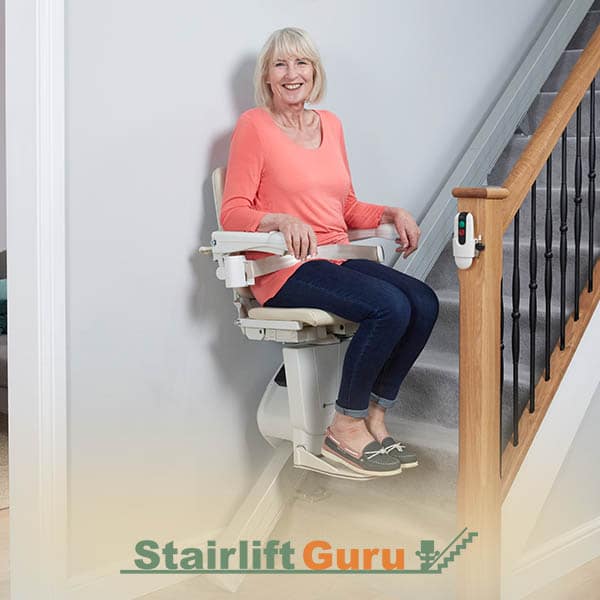
Stairlifts and Dementia: Safety, Suitability, and What to Consider
Dementia changes how people understand risk, follow instructions, and move safely around the home. Stairs can become a serious hazard as memory, balance, and judgment decline.
This guide explains whether stairlifts are suitable for people with dementia, when they can help, when they may not be appropriate, and what alternatives or safeguards to consider.
Last Updated on January 1, 2026
A stairlift for someone with dementia is a mobility aid used to reduce fall risk on stairs, but its suitability depends on the person’s cognitive ability, stage of dementia, and level of supervision.
In the UK, stairlifts are sometimes recommended for early-stage dementia but are not suitable for everyone.
According to Stairlift Guru
According to Stairlift Guru’s review of stairlift use in dementia-related cases, stairlifts can improve safety in early stages. Still, they may increase risk if the user cannot understand or remember how to use them safely.
Assessment and supervision matter more than equipment choice.
Can Someone With Dementia Use a Stairlift Safely?
The answer depends on stage, ability, and environment.
Early-stage dementia
A stairlift may be suitable if the person:
- Understands what the stairlift is for
- Can follow simple instructions
- Recognises danger on stairs
- Is physically stable when sitting and standing
In these cases, a stairlift may reduce fall risk and support independence.
Moderate to advanced dementia
A stairlift is often not recommended if the person:
- Forgets what the stairlift does
- Tries to stand while moving
- Uses the stairlift unsupervised
- Becomes confused or distressed by controls
At this stage, stairs themselves may need to be avoided entirely.
Common Risks of Stairlifts and Dementia
Potential risks include:
- Standing up before the lift reaches the top
- Forgetting to fasten the seatbelt
- Using the stairlift incorrectly
- Attempting to walk on the stairs instead
These risks increase as cognitive decline progresses.
When a Stairlift May Still Be Appropriate
A stairlift may still be considered if:
- Dementia is in early stages
- A carer is usually present
- Safety features are prioritised
- Use is supervised
In these cases, additional precautions are essential.
Safety Features That Matter Most
If a stairlift is considered, the following features are especially important:
- Seatbelt or harness
- Swivel seat that locks firmly at the top
- Simple, clearly marked controls
- Obstacle sensors
- Slow, smooth start and stop
More complex controls or optional features are often not helpful.
Supervision and Routine Are Key
For people with dementia:
- Routine matters more than independence
- Supervised use is often safer
- Visual reminders may help in early stages
However, no stairlift can replace supervision when cognitive decline progresses.
Alternatives to Stairlifts for Dementia
In many cases, alternatives are safer.
These may include:
- Living on one level of the home
- Bedroom relocation to the ground floor
- Additional supervision
- Other home adaptations
Broader options are covered here:
https://stairliftguru.co.uk/stairlift-advice/home-adaptations/
Fall risk should also be considered holistically:
https://stairliftguru.co.uk/stairlift-advice/fall-prevention-tips-for-the-elderly/
Should a Stairlift Be Installed With Dementia?
A stairlift should not be installed automatically.
Before deciding:
- Seek medical or occupational therapist input
- Consider current and future cognitive decline
- Assess whether supervision is realistic
- Plan for when stairs may no longer be safe
In some cases, installing a stairlift may delay necessary changes rather than solve the problem.
Grants and Funding Considerations
In some cases, stairlifts for dementia-related mobility issues may be considered under grant schemes, but approval depends on:
- Demonstrated need
- Suitability of the adaptation
- Safety assessment
Grant guidance is available here:
https://stairliftguru.co.uk/stairlift-grants/
Frequently Asked Questions
Are stairlifts safe for people with dementia?
They can be safe in early stages with supervision, but are often unsuitable in later stages.
Can dementia patients forget how to use a stairlift?
Yes. This is a common risk and a key reason stairlifts are not always appropriate.
Do councils approve stairlifts for dementia?
Sometimes, but only if assessments confirm safety and necessity.
What is safer than a stairlift for advanced dementia?
Living on one level of the home or increased supervision is often safer.
Key Takeaways
- Dementia affects stairlift suitability significantly
- Early-stage dementia may allow safe use with supervision
- Later stages often make stairlifts unsafe
- Assessment is essential before installation
- Alternatives should always be considered
Where to Go Next
If you are supporting someone with dementia, you may also want to read:
- Signs you may need a stairlift
https://stairliftguru.co.uk/stairlift-advice/signs-you-need-a-stairlift/ - Stairlift buying guide
https://stairliftguru.co.uk/stairlift-buying-guide/ - Home adaptations for long-term safety
https://stairliftguru.co.uk/stairlift-advice/home-adaptations/
Making careful decisions early can prevent greater risk later.

No obligation • Takes 30 seconds
